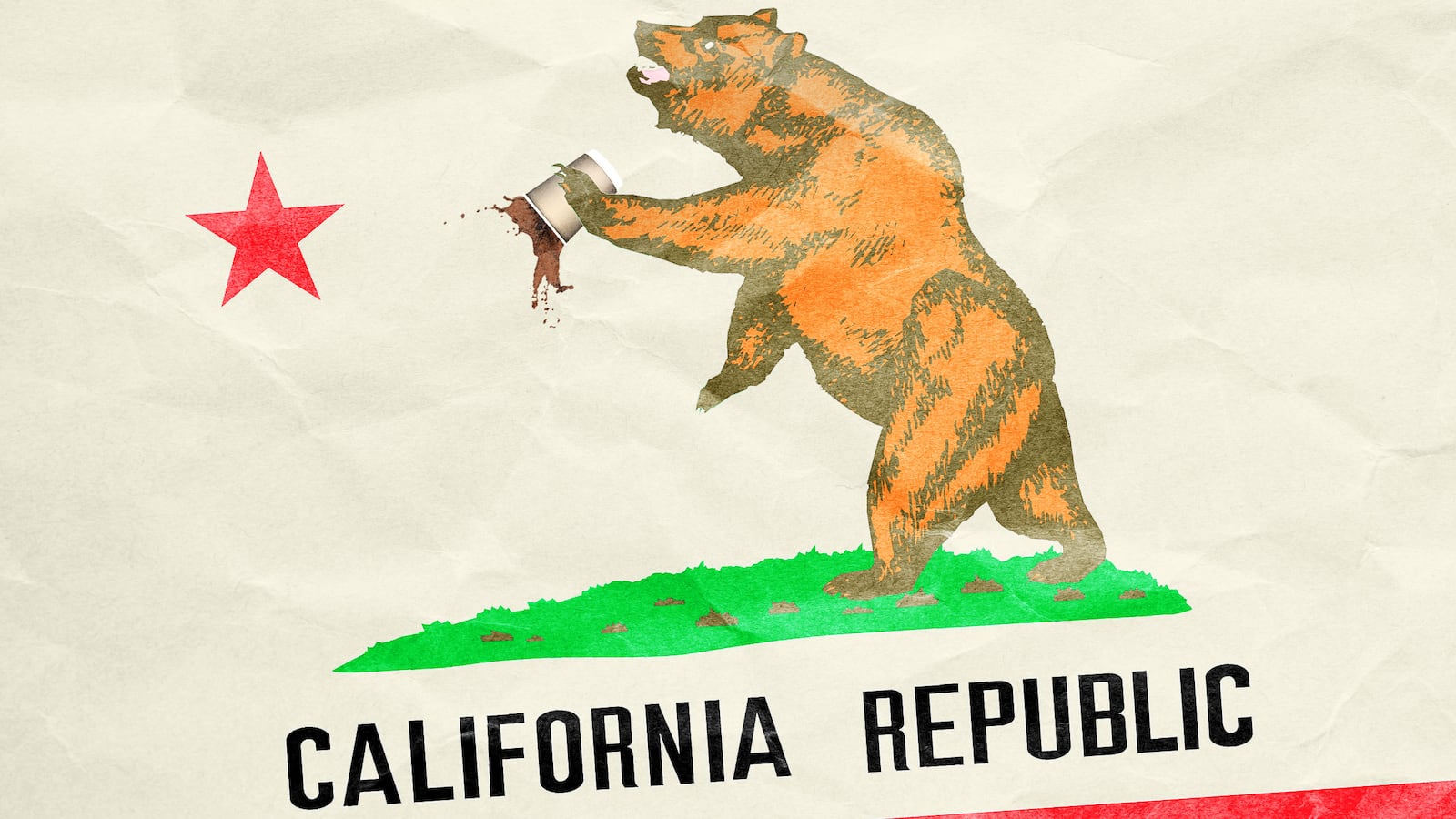Last week, a judge in California sided with the Council for Education and Research on Toxics, which had filed a lawsuit in 2010 against establishments that sell coffee—Starbucks, gas station vendors, convenience stories like 7-Eleven, and so forth—to tack on a warning to their coffee (not unlike a cigarette’s Surgeon General warning) that each cup of java contains acrylamide, a chemical produced when coffee beans are roasted.
This, of course, incited backlash from everyday coffee fans to the National Coffee Association, which made a statement calling the ruling “misleading,” saying that it did “nothing to improve public health” (PDF).
The Council for Education and Research on Toxics (CERT) is a part of the Metzger Law Group, which describes itself as a “boutique firm” focusing on environmental and toxic chemical exposure in California. In the lawsuit it brought against Starbucks (PDF), Metzger is described as “a California corporation, acting as a private attorney general, in the public interest.”
The problem with its description as the plaintiff? Its overexaggeration of the carcinogenic potential of coffee consumption is in fact a potential public disservice.
To be clear, CERT isn’t technically wrong that coffee contains acrylamides (a chemical regulated by the Food and Drug Administration) and of its cancer-causing potential.
In the National Toxicology Report, a cumulative breakdown of toxins and agents that scientists have found to cause cancer and produced by the Department of Health and Human Services, acrylamides are “reasonably anticipated to be a human carcinogen based on sufficient evidence of carcinogeneity from studies in experimental animals” (emphasis their own).
What does this mean? Scientists tested how acrylamides have affected mice and rats and have found symptoms ranging from benign thyroid and adrenal gland tumors to benign lung and mammary gland tumors. Those tumors occurred in a higher number of instances than the baseline level, which suggested to researchers of these studies that there was something about acrylamides that was problematic.
Sure, those are serious and damning results to take away from these experiments. But there’s three blaring problems with declaring coffee as a carcinogen on equal footing with, say, cigarettes.
First, these are tumors that were found in rodents. While mice and rats are often used in animal experiments for drugs as a preliminary testing ground and model for humans, the fact is that they are mice and rodents, not humans. The way humans process enzymes and chemicals and additives and so forth can be very different and have effects that can vary wildly from what happens in humans.
Second, rodent experiments often focus on dumping one chemical in large amounts into a rodent’s system. For mice and rats in these experiments, which not only have smaller bodies than humans but also are intaking inhumanly larger quantities of the chemical being tested, that means that they develop irregularities that might not occur during normal human consumption. There’s no doubt that acrylamide can cause cancer in high doses and has been proven to instigate tumors in rodents. The closest link to cancer between coffee and humans was a study that suggested there might be a link between consuming hot beverages and esophageal cancer (PDF).
But the fact is that you would have to intentionally be consuming acrylamide at ridiculous, nearly impossible-to-consume doses to even be at risk of cancer. As Popular Science pointed out with the help of a statistician, it would take an adult at highest risk to consume 160 times as much as the rodents in these experiments. Even then, that would “still only be at a level that toxicologists think unlikely to cause increased tumors in mice.” In other words, solely focusing your entire diet on acrylamide and practically imbibing the stuff can’t even guarantee that you—even mice—could get a tumor.
Which brings us to the third problem with the acrylamide lawsuit and hoopla around its apparent cancer-causing properties. It’s not just coffee that contains trace amounts of it—it’s any food that’s gone through high temperatures. That can be everything from fried chicken to roasted chicken, french fries to baked potatoes, those healthier versions of potato chips made out of root vegetables to roasted produce. To avoid acrylamides would require you to avoid virtually any food that is cooked.
The Report on Carcinogens says as much. They point to a correlation between male factory workers at places that process water soluble polymers (where acrylamides are often used) like oil recovery, water treatment facilities, and paper thickening processes. They also think there might be a correlation between Swedish, French, and American women, their diets, and instances of breast tissue showing signs of cancer, but the link was at best weak, and researchers admitted that other factors like smoking could have played a role. A 2017 meta-analysis in the European Journal of Cancer Prevention backs this up, stating “the overall evidence suggests no association of coffee intake with cancers of the stomach, pancreas, lung, breast, ovary, and prostate overall.”
So when CERT points to the fact that acrylamides are in coffee and back at Proposition 65—which states that California businesses with more than 10 employees are required by law to warn consumers if their products contain one of 65 chemicals that the state deems carcinogenic, causing birth defects, or harmful for reproductive systems—there’s a need to pause and evaluate the real risk of acrylamides.
If we’re slapping on warnings on a cup of coffee that declares it to be just as harmful as a pack of cigarettes, that’s a dangerous, illogical equivalency that results in confusion and fear mongering. Making coffee consumption the equivalent of slurping poison is ludicrous. Drinking a cup or two or even three of coffee will not be dangerous; at best, you’re a little less groggy, at worst a bit jittery. But at risk of developing tumors and cancer? Probably not.
The blatant truth is that coffee can never be as violently carcinogenic as cigarettes, and calling it a cancer causing agent doesn’t make sense, especially because no one drinks cups of coffee on end and therefore probably can’t be poisoned by coffee in any way. In fact, the National Cancer Institute says as much on its website, noting that acrylamide levels vary and that “people are exposed to substantially more acrylamide from tobacco smoke than from food.”
And there are certainly worse chemicals to worry about than a minute trace of acrylamides in coffee. Remember the trans fat bans that swept the nation about a decade ago? Hydrogenated fats are legitimately dangerous to consume, and the heightened attention given to their near-ubiquity in processed foods and ties to heart disease, diabetes, and stroke were well documented in humans to cause negative outcomes.
But acrylamides in coffee? Nah.
If anything, Proposition 65 and the case of labeling coffee as carcinogenic is indicative of the messiness of food studies, particularly with respect to those that teeter between sin and healthy indulgence. There’s probably no such thing as eating too many vegetables and facing negative consequences. But foods like coffee, eggs, wine, and chocolate fall in a grey area. They’re lusciously sinful and offer something almost tantalizingly indulgent with their richness, so it makes sense that we’re always trying to gauge whether or not these foods that bring us so much joy are good or bad.
The messaging, of course, is frustrating. One minute wine is heralded for its antioxidant properties, the next it’s vilified for its connection to various liver issues. Chocolate is similarly celebrated for its antioxidant properties, but really, who only has one square of it? Eggs too have sparked debate among industry experts who point to the whites as excellent sources of protein and nutrients, but the yolk is one big nutritional question mark.
Coffee is like these foods, hopping back and forth between linked to a 64 percent decrease in early death and its current status as potential carcinogenic. It’s apparent benefits address American health epidemics: reductions in developing Type 2 diabetes and heart disease and stroke. Its benefits seem universal, linked to longer lives among Americans across demographic and socioeconomic lines, in both its caffeinated and decaffeinated forms. It might decrease rates of breast cancer and liver cancer. Of course, these are results that should be taken with a grain of salt, but they’re benefits worth noting in light of California’s painting of coffee as a demonic chemical.
The point is this: “Everything in moderation” is a great nutritional phrase because it rings so true. Every human body is different thanks to the complicated gymnastics of genes and environment and chance that make everyone’s nutritional needs different. Seeking to figure out if a food is good or bad does nothing but muddle the debate; simply put, foods that don’t fall into fruits, vegetables, legumes, water, or their ilk have good and bad qualities to them, and understanding your unique physiology and dietary needs will make their consumption either safe or not so much so for you. And it’s crucial to remember that niche food industries have well-oiled marketing groups that also fund studies and constantly attempt to veer public attention toward the nutritional benefits of food to eek up their profits. Food is, after all, big business.
Which brings us back to the case of the evil cup of java, Proposition 65, and how coffee might become a villain in the state of California. Putting a warning on a cup of coffee is going to not only confuse customers, it takes away from a daily pleasure for the majority of Americans. A cup of coffee makes people less grumpy, more alert, and simply more awake. It’s a bonding activity, a much-needed break in our harried world, and an art form whose most ardent fans will compare its roasting and farming and brewing to those of wine. To make coffee a nutritional devil is a step gone too far (at this rate, any foodstuff that goes through some heating for cooking could contain acrylamides).
The bottom line: Coffee is safe. Labeling it a carcinogenic is not.





